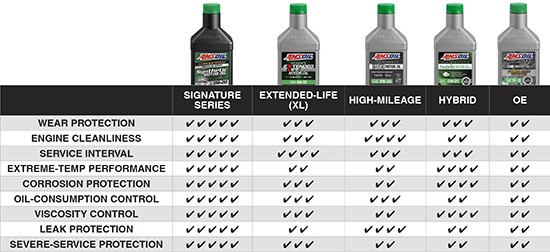Mixing Motor Oils: Can You Safely Combine Synthetic and Regular Oil?
When it comes to vehicle maintenance, the type of motor oil you choose can make a significant difference in engine performance and longevity. With the growing popularity of synthetic oils, many car owners find themselves wondering: can you safely combine synthetic and regular oil? While each oil type has its benefits, mixing them can create uncertainty about lubrication quality, engine protection, and potential risks. In this article, we’ll delve into the intricacies of motor oil compatibility, exploring the science behind oil formulations and what happens when they are blended. Whether you’re an experienced mechanic or a casual driver looking to better understand your vehicle’s needs, join us on this informative journey to uncover whether mixing motor oils is a safe and effective choice for your engine.
Understanding Motor Oils: Types and Functions
Motor oils play a crucial role in the functionality and health of a vehicle’s engine. They provide lubrication to reduce friction between moving parts, which helps to prevent wear and tear. Additionally, motor oils help to dissipate heat generated within the engine, ensuring that it operates within an optimal temperature range. They also aid in cleaning the engine by carrying away contaminants and debris, which are then trapped by the oil filter. Without the proper motor oil, an engine can quickly become damaged, leading to costly repairs and reduced performance.

There are primarily two types of motor oils: synthetic and regular (or conventional) oil. Regular oil is derived from crude oil and has been used in engines for decades. It provides basic lubrication and protection for engine parts but tends to break down more quickly under extreme conditions. Synthetic oils, on the other hand, are chemically engineered to provide superior performance. They are designed to withstand high temperatures and pressures, maintain viscosity longer, and offer better protection against deposits and sludge.
The choice between synthetic and regular oil can depend on various factors, including driving habits, vehicle type, and manufacturer recommendations. Both types have their pros and cons and understanding these can help car owners make informed decisions about their vehicle maintenance. The introduction of synthetic oils has led to questions about whether these two types can be mixed and, if so, what the implications might be.
The Differences Between Synthetic and Regular Oil
The primary difference between synthetic and regular oil lies in their composition and manufacturing process. Regular oil is refined from crude oil and contains a mix of hydrocarbons, additives, and impurities. While it provides essential lubrication, its performance can degrade under extreme conditions, such as high heat or heavy loads. This degradation can lead to the formation of sludge and deposits, which can affect engine performance.
Synthetic oil, on the other hand, is created through a complex chemical process that results in a purer, more consistent product. It contains fewer impurities and more uniform molecules, which provide better stability and performance. Synthetic oils are designed to resist breakdown, maintain their viscosity, and protect engines over a wider range of temperatures and conditions. They often contain advanced additives that enhance their protective properties, making them ideal for high-performance and modern engines.
Another key difference is the cost. Synthetic oils are generally more expensive than regular oils due to their complex manufacturing process and superior performance characteristics. However, the higher cost can be offset by the longer intervals between oil changes and the enhanced protection they offer. This can lead to savings over time, particularly for vehicles that require frequent or heavy-duty use.
Can You Mix Synthetic and Regular Oil?
The question of whether you can mix synthetic and regular oil is common among car owners. The short answer is yes; it is possible to mix the two types of oil. However, several factors need to be considered before doing so. Mixing oils can lead to a blend that may not offer the full benefits of either type, potentially affecting engine performance and protection.
When synthetic and regular oils are mixed, the chemical properties of both oils interact. While they are
generally compatible, the resulting blend may not perform as well as pure synthetic oil in terms of stability, viscosity, and protection against deposits. Regular oil can dilute the advanced additives in synthetic oil, reducing its effectiveness. This can be particularly problematic in high-stress situations, such as towing or extreme temperatures.
It’s also important to consider the manufacturer recommendations for your vehicle. Many manufacturers
specify the type of oil that should be used based on the engine design and performance requirements. Mixing oils that do not meet these specifications can void warranties and lead to potential damage. Therefore, while mixing synthetic and regular oil is technically possible, it is not always advisable unless in an emergency situation where no other option is available.
Potential Risks of Mixing Motor Oils
Mixing synthetic and regular oil can introduce several risks that may affect the engine’s performance and
longevity. One of the primary risks is the potential for reduced lubrication quality. Synthetic oils are engineered to provide superior lubrication and protect engine components from wear and tear. When mixed with regular oil, the effectiveness of these properties can be compromised, leading to increased friction and potential damage to engine parts.
Another risk is the possibility of chemical incompatibility. While most synthetic and regular oils are designed to be compatible, there can be variations in their formulations that may not interact well when mixed. This can result in the formation of sludge or deposits, which can clog the oil passages and reduce the engine’s efficiency. Additionally, the presence of impurities in regular oil can negate the benefits of synthetic oil, leading to increased maintenance needs.
Finally, mixing oils can complicate the process of determining the appropriate oil change intervals. Synthetic oils generally have longer intervals between changes due to their stability and resistance to breakdown. Regular oils, however, require more frequent changes. When mixed, it can be challenging to determine the optimal time for an oil change, potentially leading to either premature changes or prolonged use of degraded oil, both of which can harm the engine.
Effects on Engine Performance and Longevity
The choice of motor oil has a direct impact on engine performance and longevity. Synthetic oils are known for their ability to maintain viscosity and provide consistent lubrication over a wide range of temperatures and conditions. This leads to smoother operation, improved fuel efficiency, and reduced wear on engine components. Regular oils, while adequate for basic lubrication, may not offer the same level of protection, especially under extreme conditions.
When synthetic and regular oils are mixed, the benefits of synthetic oil can be diluted. This can result in less effective lubrication, increased friction, and potential overheating. Over time, these factors can contribute to accelerated wear and tear on the engine, reducing its lifespan. Additionally, the presence of deposits and sludge from regular oil can further impair engine performance and efficiency.
Furthermore, the use of mixed oils can affect the engine’s ability to start and run smoothly, particularly in cold weather. Synthetic oils have superior low-temperature properties, ensuring easy starts and rapid lubrication in cold conditions. Mixing with regular oil can reduce these benefits, leading to harder starts and increased stress on the engine. This can be particularly problematic for vehicles operated in cold climates or those that require frequent starts and stops.
Manufacturer Recommendations and Guidelines
Vehicle manufacturers provide specific recommendations and guidelines regarding the type of motor oil that should be used for their engines. These recommendations are based on extensive testing and engineering considerations to ensure optimal performance and protection. It’s important for car owners to adhere to these guidelines to avoid potential issues and maintain their vehicle’s warranty.
Most manufacturers specify whether synthetic or regular oil should be used, and some may even recommend specific brands or formulations. These recommendations take into account factors such as engine design, operating conditions, and expected performance. Using the recommended oil helps to ensure that the engine operates efficiently and remains protected against wear and contaminants.
If a manufacturer recommends synthetic oil, it is generally best to use only synthetic oil and avoid mixing it with regular oil. Mixing oils that do not meet the manufacturer’s specifications can lead to reduced
performance, increased wear, and potential warranty issues. It’s also important to follow the recommended oil change intervals to ensure that the engine remains well-lubricated and protected over time.
Signs You Might Need an Oil Change
Regular oil changes are essential for maintaining engine health and performance. There are several signs that can indicate it is time for an oil change. One of the most common signs is the presence of dark, dirty oil. Clean motor oil is typically amber in color, while dirty oil appears dark and murky. This indicates that the oil is filled with contaminants and no longer provides effective lubrication.
Another sign is increased engine noise. Motor oil helps to reduce friction and dampen engine noise. If the
engine becomes louder or starts making unusual sounds, it may be a sign that the oil is no longer providing adequate lubrication. This can lead to increased wear on engine components and potential damage if not addressed promptly.
Decreased performance and fuel efficiency can also indicate the need for an oil change. As motor oil breaks down, it becomes less effective at reducing friction and maintaining viscosity. This can lead to reduced engine efficiency, increased fuel consumption, and sluggish performance. Regular oil changes help to ensure that the engine operates smoothly and efficiently.
Best Practices for Maintaining Your Engine Oil
Proper maintenance of engine oil is crucial for ensuring long-term performance and reliability. One of the best practices is to adhere to the manufacturer’s recommended oil change intervals. This helps to ensure that the engine remains well-lubricated and protected against wear and contaminants. Regular oil changes also help to prevent the formation of sludge and deposits that can impair engine performance.
Using the correct type of motor oil is another important practice. Following the manufacturer’s
recommendations regarding synthetic or regular oil ensures that the engine receives the appropriate level of protection and lubrication. It’s also important to use high-quality oil filters to trap contaminants and keep the oil clean. Regularly checking the oil level and topping up as needed helps to prevent low oil levels that can lead to engine damage.
Maintaining proper engine oil is also about monitoring the oil’s condition. Regularly inspecting the oil for signs of contamination or degradation, such as dark color or unusual odor, helps to identify potential issues early. Additionally, keeping an eye on the oil pressure gauge and addressing any sudden drops in pressure can prevent serious engine problems. By following these best practices, car owners can ensure that their engine remains healthy and performs optimally.
Alternatives to Mixing Motor Oils
For car owners who are considering mixing synthetic and regular oil, there are several alternatives that can provide better results. One alternative is to fully switch to synthetic oil. Synthetic oils offer superior
performance and protection, making them an excellent choice for modern engines. By using only synthetic oil, car owners can avoid the potential risks and complications associated with mixing oils.
Another alternative is to use synthetic blends. Synthetic blends combine synthetic and regular oils in a
controlled ratio, providing many of the benefits of synthetic oil while maintaining a lower cost. These blends are formulated to ensure compatibility and consistent performance, making them a good option for those looking to improve their engine’s protection without fully switching to synthetic oil.
Finally, car owners can opt to follow the manufacturer’s recommendations and use only the specified oil type. This ensures that the engine receives the appropriate level of protection and lubrication, avoiding any potential issues with mixing oils. By adhering to these recommendations, car owners can maintain their vehicle’s warranty and ensure optimal engine performance.
Conclusion: Making the Right Choice for Your Vehicle
Choosing the right motor oil for your vehicle is a critical decision that can impact engine performance and
longevity. Can you safely combine synthetic and regular oil? While mixing synthetic and regular oil is technically possible, it introduces several risks and
potential complications that can affect the engine’s health. Understanding the differences between synthetic and regular oil, and adhering to manufacturer recommendations, helps to ensure that your engine remains well-protected and performs optimally.
Regular maintenance, including timely oil changes and using the correct oil type, is essential for maintaining engine health. By following best practices and monitoring the condition of your engine oil, you can prevent issues and extend the lifespan of your vehicle. Considering alternatives to mixing oils, such as fully switching to synthetic oil or using synthetic blends, can provide better results and avoid potential risks.
Ultimately, making informed decisions about your vehicle’s motor oil helps to ensure that it remains reliable and efficient. Whether you’re an experienced mechanic or a casual driver, understanding the intricacies of motor oil compatibility and following manufacturer guidelines will help you make the right choice for your engine’s needs.


